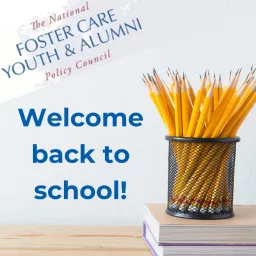Over the last 10 years, the Council has put equitable educational opportunities for foster youth forward in many of our priority statements. We firmly believe that education provides young people in foster care critical connections and tools they need to thrive as adults.
“When I started high school, my life was in a downward spiral. I was fortunate enough to have some people that recognized that I had something better to offer and that I had the choice to change my life around. Without these people, I don’t know if I’d be here today.”
Here’s a few ways we think youth in foster care should be best supported at school. Please see the linked priority statements for more details!
Nourish School-Based Relationships (2017)
- Teachers and guidance counselors should be trauma-informed and have insight into the effects of foster care and the impact that trauma can have on foster youth.
- In addition, youth in foster care should be encouraged and assisted to participate in extracurricular activities at school to establish peer-to-peer relationships and bond with coaches, mentors, or other positive adult role models.
Make education separate from placement (2016)
- The Council recommends that youth in placement at congregate care facilities receive their education from another entity unrelated to the congregate care facility, or that the oncampus education programs be accredited/licensed.
Give us support and guidance for our educational goals (2015)
- Depending on the interest and skills of each foster youth, we should receive support and guidance in applying for educational enhancements with college and scholarships.
Prioritize our access to 504s and IEPs, thus increasing our educational success (2014)
- The particular needs of youth in foster care are ignored because school districts must work with limited resources to provide an appropriate educational setting for as many students as possible. When young people in care demonstrate a need for special accommodations in a school setting, schools should act swiftly to address the need and offer corresponding accommodations.
Increase knowledge and skills of those who aid in the advancement of education of foster children (2013)
- Former foster youth reported that when their caseworker, foster parents, school counselors and other child welfare professionals were educated about the available resources and took individual time to discuss higher education with them, they were more successful in getting into a program in higher education.
Colleges and universities should support the creation of programs with designated campus support staff who are trained to address the specific needs of young people from care (2013)
- This training should include a history of foster care culture and knowledge of resources available. The staff person should be available to assist students from foster care (giving the student the option to access this assistance) and inform fellow departments.
Provide tuition waivers for all current and former youth in care, regardless of the state (2013)
- The Council recommends exploration to begin to create a nationwide tuition waiver for foster youth so they are not limited by age requirements, local resource availability, or family circumstances beyond their control.
Support post-secondary institutions and child welfare agencies in establishing year round housing (2013)
- The Council recommends post-secondary education institutions be provided with guidance, either in the form of technical assistance or general information, about how to establish policies to implement year-round housing for youth in and from foster care
“My school knew I needed access to special education services due to my learning difficulties and low performance, but they attributed my problems to my behavior and foster care experience. It wasn’t until college when I was officially diagnosed with a learning disability, one I’ve had since my childhood.”
Have a great school year!

